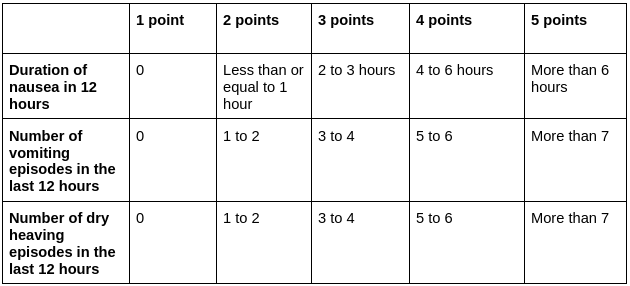What Is Morning Sickness?
Morning sickness is a common symptom that presents as nausea and vomiting during pregnancy. It begins two to four weeks after fertilization, remains high between nine to sixteen weeks of gestation, and resolves by 22 weeks.
What Are the Risk Factors of Morning Sickness?
Pregnant women who have a history of motion sickness, migraine, exposure to birth control pills before pregnancy have an increased risk of developing morning sickness during pregnancy. Hyperemesis gravidarum (HG) or severe nausea and vomiting occurs commonly in pregnant women who have a family history of HG, pregnancy with girl babies, and had hyperemesis gravidarum in their last pregnancy.
What Are the Causes of Morning Sickness?
The common cause of morning sickness is the hormonal changes observed during pregnancy. The other health conditions causing morning sickness are low blood sugar level, twin pregnancy, extreme fatigue, stress, and frequent traveling.
What Are the Symptoms of Morning Sickness?
The symptoms are nausea with or without vomiting during the first few weeks of pregnancy, nausea after eating spicy foods, dizziness, fainting while standing, blood vomiting, raised heart rate, and nausea after severe salivation.
What Are the Complications of Morning Sickness?
Nausea and vomiting during pregnancy cause loss of appetite. But it does not affect fetal growth and development. Women experiencing vomiting beyond three to four months of pregnancy need to consult a doctor for treatment.
But some women experience nausea with severe vomiting and weight loss, resulting in hyperemesis gravidarum (HG). The affected woman experiences electrolyte imbalance with ketonuria and nutritional deficiency. This condition can cause harm to the baby. In severe cases, hospitalization is required, and intravenous fluids are given for rehydration.
What Is Pregnancy Unique Quantification of Emesis (PUQE) Score?
Pregnancy unique quantification of emesis (PUQE) is a scoring system used to track the severity of nausea and vomiting in pregnancy (NVP). It also serves as a guide to determine its treatment.
The PUQE score assesses the severity of nausea and vomiting during pregnancy based on three essential factors: nausea, vomiting, and retching over 12 hours using the Rhodes index (a self-report that consists of a few sets of questions regarding the frequency and severity of nausea, vomiting, retching and dry heaves). The PUQE score is based on three questions that correlate with the scores of the Rhodes index .

The total score is the sum of replies given to these three questions.
Nausea Score:
-
Mild NVP - Less than or equal to 6.
-
Moderate NVP - 7 to 12.
-
Severe NVP - More than or equal to 13.
Modified Pregnancy Unique Quantification Emesis Index:
The original PUQE was focused on 12 hours, and later it was modified to 24 hours.

The final score is the sum of replies given for the three questions.
Nausea Score:
-
Mild NVP - Less than or equal to 6.
-
Moderate NVP - 7 to 12.
-
Severe NVP - More than or equal to 13.
PUQE helps to determine whether nausea and vomiting during pregnancyare mild, moderate, or severe. If the score is moderate or severe, the condition needs thorough assessment for the presence or absence of dehydration, weight changes, and other laboratory tests to check electrolyte imbalance.
What Are the Tests Used for Diagnosing Morning Sickness?
Based on the symptoms of the pregnant woman, the doctor advises doing urine tests, complete blood count, a comprehensive metabolic panel to check the balance of electrolytes, and ultrasound to see the growth of the baby.
How to Manage Morning Sickness?
Pharmacologic Management:
Morning sickness during pregnancy is reduced by taking Ondansetron. Other medications prescribed to reduce nausea and vomiting are antihistamines, Phenothiazine, Metoclopramide, and antacids.
Non-Pharmacologic Management:
1) Dietary changes are the initial therapy for NVP. It is good to eat food in small amounts rather than taking larger quantities at a time. It is advisable to take foods that are rich in proteins and low in fats. Water can be taken in small amounts when needed.
2) Ginger supplements are also effective in treating NVP.
3) Acupressure applied at pericardium 6 (a point on the wrist) also decreases nausea and vomiting in pregnant women.
4) Women with hyperemesis gravidarum require thiamine supplementation regularly as it reduces nausea. Thiamine is the active form of vitamin B1. The daily requirement of thiamine during pregnancy is 1.5 mg/day.
How to Prevent Morning Sickness?
Morning sickness can be prevented by drinking plenty of water before and after meals. Avoid eating spicy foods, fatty foods, and cigarette smoking. Having proper ventilation at home and the workplace prevents morning sickness. If any of these preventive measures do not help, it is good to consult a doctor soon.
Conclusion:
Morning sickness is a common problem experienced by most pregnant women. It can be managed and prevented by following the steps mentioned above.












